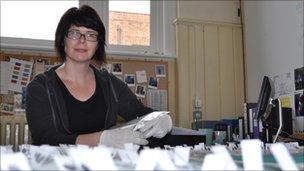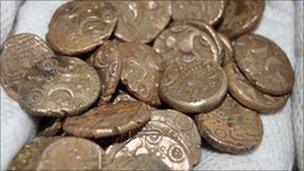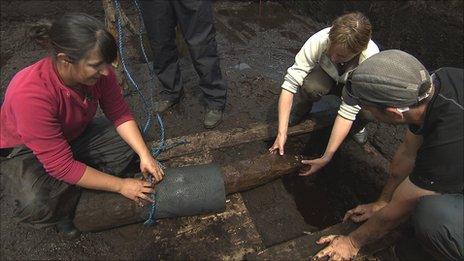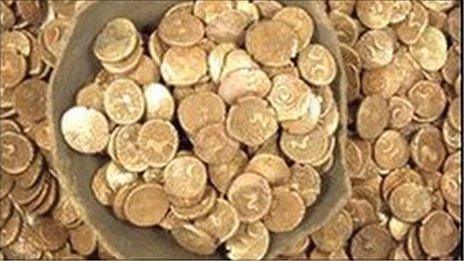Iceni gold coin hoard clean-up at Ipswich Museum
- Published

Caroline McDonald with the individual records of the 840 gold coins
People have flocked to help clean a collection of 2,000-year-old gold coins found in a Suffolk field.
The Wickham Market Hoard of 840 coins has been on display in Ipswich and it will later be visiting Colchester, Norwich and Cambridge.
Ipswich Museum has filled the 50 free places it was offering to people for its cleaning workshops.
Caroline McDonald, curator, said: "We wanted our contemporary communities to experience the coins close up."
The hoard, which was in the remains of a pot, was found in 2008 by a man using a metal detector.
Ipswich Museum had to raise £300,000 to keep the collection in Suffolk after it was declared to be treasure at an inquest.
Tribal heartlands
The coins belonged to the Iceni tribe and are thought to date from 40 BC to 15 AD, pre-dating Queen Boudicca who led the revolt against Roman rule which destroyed Colchester in 60 AD.
Ms McDonald said: "Cambridge and Norfolk are part of the Iceni tribal heartlands, so essentially we're sending the coins back to where they came from.
"I like to think emotionally we're all related to the Iceni because we tread in those places that they trod 2,000 years ago.
"It's quite unusual for us to have members of the public in the conservation lab and even more unusual to have them around our treasure."
The coin cleaning and stabilisation project involves removing any remaining soil and corrosion using cotton swabs and alcohol, lacquering them and adding a tiny label.
Emma Hogarth, conservation officer, said: "Normally, if we were cleaning a Roman coin, we would clean each individual one under a microscope using scalpels and pins, but as these are in such good condition we don't have to do that.

The 840 Iron Age gold coins are about 1cm in diameter
Time-consuming
"If they're pure gold, they don't decay, but as there is some copper in these ones, we do have a little bit of corrosion.
"It's certainly time-consuming which is why we're delighted to have the public get involved in the work we've got to do."
There is still a mystery as to why valuable gold was buried.
Ms McDonald said: "This is an incredible amount of wealth that went into the ground. Were they a gift to the gods? Were they to pay warriors to defend you?
"Something was happening to this community and we have to try and remember there's a very human story to why these things were put in the ground.
"There were native Britons here before the Romans and these coins were from the generation of, possibly, Boudicca's grandparents."
An exhibition of Chinese treasures from Nanjing Museum is taking place in Colchester next year and, in return, the coins could go on display in China in 2013.
- Published16 August 2011

- Published27 April 2011
